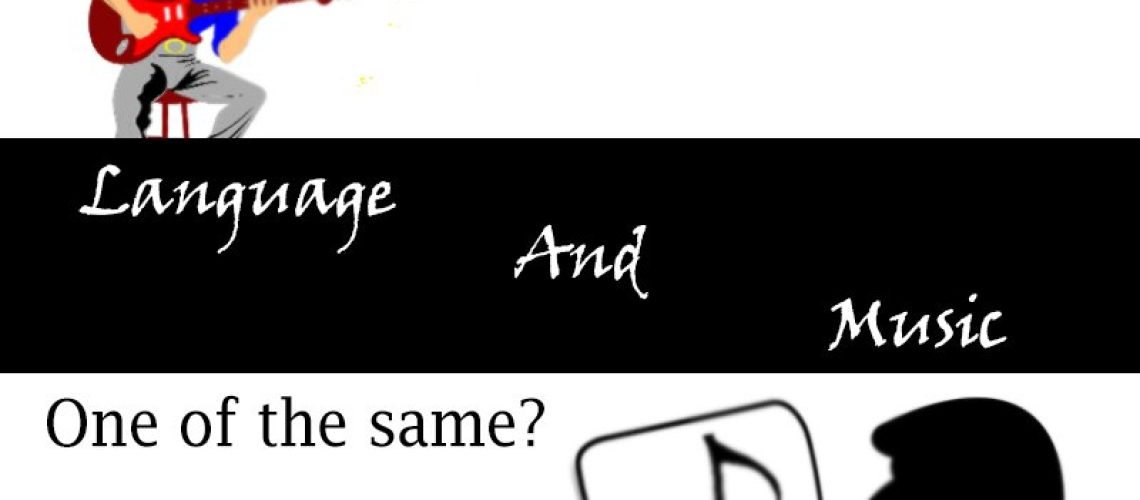Music is very complex. It conveys emotion, it is used to communicate an idea, and it follows many rules. It often takes a musician four or five years before they actually fully grasp their instrument; it could be ten or fifteen before they master them. If you think that this sounds familiar, then you are right because it should. This description can also describe language. Language is complex. It also conveys emotion, it is also used to communicate ideas, and it also follows many rules. When we originally started speaking our first language we didn’t fully grasp the structure and idea of it until we started our primary education when we were four or five, and even then, it took years after that to be competent.
So with this in mind, can language be seen as music?
Maybe.
When one is asked “what is the definition of music?”, a common response is “organised sound”, or sound that is arranged in a way to evoke emotion, and convey feelings. Is language not also organised sound? Do we not arrange words and inflections of those words to convey our feelings to someone or to evoke an emotion from someone? An argument against this point would say that language does not contain the elements of music that distinguishes it from language: melody, rhythm, and texture. But it does. In its rudimentary form, melody is a series of pitches occurring one after another. This could also pertain to a sentence. We speak in pitches even if we don’t realise it. Every word that comes out of our mouth has a corresponding frequency, and each frequency can be related to a musical note. This can be seen in videos such as this one: LINK. As you can see the guitar player can identify the pitch of all the words that are being spoken and plays notes of the same pitch parallel on his guitar.
Rhythm is also apparent in language when you reflect on how you say particular words and how the number of syllables affects your pronunciation. In every word, there Is an assigned rhythm, for example the phrase “assigned rhythm” has 4 syllables but If you were to notate it musically it would consist of 4 semi quavers:
Without even noticing, we are creating some sort of rhythm in every conversation we partake in.
Then there is texture. Texture is how melody, rhythm, and harmony merge to form one piece of music. Surely a sentence read aloud with only a single melody can’t be interpreted as music. If you want to create music you must have multiple parts occurring simultaneously. That is not the case. One of the earliest recorded examples of music is called the Gregorian chant where catholic monks would sing sacred hymns unaccompanied. LINK When a piece of music has no accompaniment, it is described as having a monophonic texture. So, why can’t language just be described as monophonic? If Gregorian Chants have a melody and rhythm but no accompaniment and is accepted as music, there should be no reason that language be restricted in recognition. But it is. Maybe because we use language so frequently, and if language was to be described as music it’d take the exclusivity away from music.
So then, is music a language?
Yes. Definitely.
A language must have two main components: a formal symbolic system, and it must act as a tool to communicate. Most languages have a way of conveying itself through writing; a system of symbols and rules for said symbols that help form coherent, understandable sentences. It is true for every language in the world, and music is no different. There are specific rules you must follow when notating music in order for other musicians to comprehend what you are trying to communicate, just like with grammar in a conventional language.
A great example of notating music on a stave would be this extract from a piece for piano:
The linguistic equivalent of this would be a perfectly constructed sentence with no errors with grammar, spelling, or punctuation. A bar in music theory has the exact same function as a sentence in language. It is a small piece of a greater entity, and if that small piece makes no sense it subtracts from the greater entity.
Here is the same extract as before except the quality of this notation is drastically different.
The linguistic equivalent of this would be a sentence with an enormous amount of spelling mistakes, horrible grammar, and a complete lack of capitalization and punctuation. Correct structure of the system of symbols established in a language is paramount to understanding English, French, Spanish, and Music. Music has an important, established structure and system of symbols that without would complete hinder music from being shared, so it ticks the box for a formal symbolic system.
But what about it being a tool to communicate? Can music be used as a tool for communication?
While not being a conventional everyday tool for communicating, it is a unique and effective way to communicate emotions. A piece of music can convey love, sadness and frustration. No other form of communication is as effective as music. Words can only do so much; with music, you have an endless combination of sounds that can completely surround you with the emotion that is trying to be conveyed. It is indubitably a tool to communicate.
So, with all these points considered what are we left with?
In my opinion, music can definitely be referred to as a language. In popular culture, it is fundamentally recognised as one. It has a formal symbolic system, and it is a tool to communicate. Contest arises only when you swap the words. Language is not considered music, even though it shares elements of music as I have shown above. I think it’s just that the world views language as this naturally occurring construction that we have from birth. That it is programmed into our system before we leave the womb, but that’s not the case. We learn it from a very young age so in turn it feels natural. If we were to learn music from that early an age, music would also feel as natural. But because we don’t, and it really is a matter of choice to learn music, if language was considered music, then music would be far too common in our lives and its impact would decline.
Music is a language.
BUT
Language is not music, but it is musical.
by Luke Spencer










